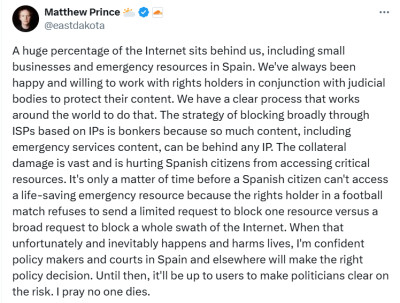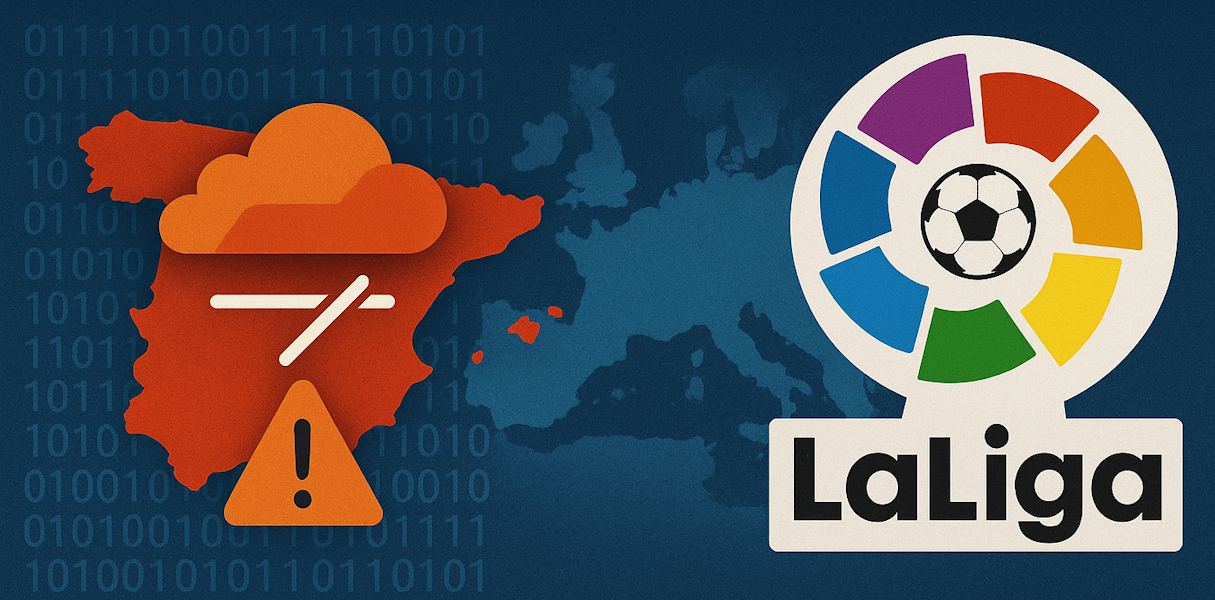Spanish internet users experience widespread outages of Cloudflare-hosted websites as of October 18, 2025, after LaLiga initiated court-approved IP blocks aimed to stop illegal football streams.
Spain’s Internet Service Providers (ISPs) began widespread blocks on Cloudflare IP addresses on October 18. The move comes as an anti-piracy measure intended to curb unauthorized Spanish football league broadcasts.
However, illegal streaming sites like TiroAlPalo weren’t the only websites users across Spain were unable to access. The blocks affected gaming servers like Blue Protocol and legitimate websites relying on Cloudflare’s infrastructure.
As a result, users are searching for VPN services. VPNs, or Virtual Private Networks, are tools that change your IP address and let you bypass geo-restrictions on websites that are blocked at IP level.
According to Google Trends data, NordVPN searches reached peak popularity in Spain during the October 18-19 period.
The continuous anti-piracy fight
The widespread disruptions come after the continuous legal and technical battle between the IT service management company Cloudflare and the Spanish football league LaLiga.
During the last season of LaLiga, the organization has been issuing blocks for around 3,000 IP addresses every weekend to prevent illegal content distribution.
On February 15, 2025, LaLiga came out with a statement accusing Cloudflare of enabling illegal activities.
“More than 50% of pirate IPs illegally distributing LALIGA content are protected by Cloudflare. Despite multiple formal requests from LALIGA for Cloudflare to cease its collaboration with pirate sites, the company has refused to cooperate, instead continuing to profit from the criminal activity it helps to conceal,” the official statement said.
However, Cloudflare has said that such anti-piracy measures are problematic. According to an X post by Matthew Prince, the CEO of Cloudflare, on May 21, 2025, “The strategy of blocking broadly through ISPs based on IPs is bonkers because so much content, including emergency services content, can be behind any IP.”

The IT service management company has asked the court to overturn the ruling in the past, but the Commercial Court No. 6 of Barcelona rejected it.
VPNs to the rescue
With blocking measures affecting many online websites, users in Spain are turning to VPNs, which have become essential to maintain privacy and internet freedom.
For example, Google Trends data showed that the term “VPN” reached peak popularity on October 19.
At the same time, Proton VPN announced that their free version’s new user registrations from Spain surged by 200%.
While VPNs are currently a go-to solution for many Spaniards, the situation sparks deeper debate on how to balance combating piracy and preserving internet freedom.
Prince has highlighted the unintended consequences of aggressive anti-piracy measures, claiming it can stop users from accessing critical resources.
“When that unfortunately and inevitably happens and harms lives, I'm confident policy makers and courts in Spain and elsewhere will make the right policy decision. Until then, it'll be up to users to make politicians clear on the risk,” said Prince.


